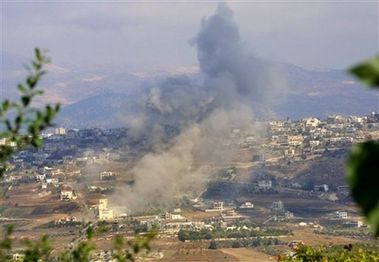 By RAMIT PLUSHNICK-MASTI, aug 13, Associated Press Writer , JERUSALEM – After a stormy debate Sunday, Israel’s Cabinet approved a Mideast cease-fire, agreeing to silence the army’s guns in less than 24 hours. The Israeli military embarked on a last-minute push to devastate Hezbollah, rocketing south Beirut with at least 20 missiles. The 24-0 vote, with one abstention, came a day after the Lebanese government approved the agreement, and Hezbollah leader Hassan Nasrallah gave his grudging consent. The truce was to take effect Monday morning.As the vote took place, Israeli shells slammed into the hard-hit Dahiyeh suburb, a Hezbollah stronghold just south of Beirut, Lebanese television stations said. Al-Arabiya said several buildings were destroyed.
By RAMIT PLUSHNICK-MASTI, aug 13, Associated Press Writer , JERUSALEM – After a stormy debate Sunday, Israel’s Cabinet approved a Mideast cease-fire, agreeing to silence the army’s guns in less than 24 hours. The Israeli military embarked on a last-minute push to devastate Hezbollah, rocketing south Beirut with at least 20 missiles. The 24-0 vote, with one abstention, came a day after the Lebanese government approved the agreement, and Hezbollah leader Hassan Nasrallah gave his grudging consent. The truce was to take effect Monday morning.As the vote took place, Israeli shells slammed into the hard-hit Dahiyeh suburb, a Hezbollah stronghold just south of Beirut, Lebanese television stations said. Al-Arabiya said several buildings were destroyed.
Earlier Sunday, Israeli warplanes fired missiles into gasoline stations in the southern port city of Tyre, killing at least ten people in those and other attacks. Fierce ground fighting involving 30,000 Israeli troops continued in the south, where Israel lost 24 soldiers Saturday, including five on a helicopter shot out of the air by the Lebanese resistence. In Jerusalem, a heated debate erupted during the Cabinet session, with minister Ofir Pines-Paz criticizing the government’s decision to order an expanded ground offensive in the days before the cease-fire is to take effect.
Israeli Prime Minister Ehud Olmert immediately praised the Cabinet’s decision, saying "Hezbollah won’t continue to exist as a state within a state."
"The Lebanese government is our address for every problem or violation of the agreement," Army Radio quotes him as saying.
The cease-fire was to go into effect at 8 a.m Monday. After a halt in fighting, some 15,000 Lebanese troops and an equal number of U.N. forces were to be deployed in south Lebanon and create a Hezbollah-free zone, from the Israel-Lebanon border to Lebanon’s Litani River, some 18 miles from the border.
Israel said it hopes Lebanese troops will start deploying quickly, within a week or two.
"When the Lebanese and multinational force enters, Israel will withdraw and not before," Israeli Cabinet minister Yaacov Edri said after the Cabinet vote.
Former Defense Minister Shaul Mofaz abstained in the vote, said a senior government official who spoke on condition of anonymity.
The Lebanese government approved the deal Saturday, and Nasrallah signaled grudging acceptance, but also warned that "the war has not ended." On Sunday, Hezbollah fired more than 150 rockets at northern Israel, killing an Israeli man.
In the Cabinet meeting, Olmert praised the cease-fire agreement approved by the UN security counsil, saying it will prevent a return to the status quo in which Hezbollah ran a state-within-a-state in south Lebanon, participants said.
Vice Premier Shimon Peres said that while Israel has to learn lessons from the war, "in my view, we came out of this with the upper hand, both politically and military."
The deal was seen at best as a draw with Hezbollah, and some felt Israel — unable to subdue a guerrillas force — had lost.
The Cabinet session was overshadowed by rising Israeli casualties. Twenty-four soldiers were killed Saturday and at least 73 wounded.
Hezbollah appeared to be fighting as fiercely as ever. The guerrillas shot down an Israeli helicopter, a first in the war, and killed five crew members. Other troops were killed by Hezbollah anti-tank missiles. The army said it killed more than 50 Hezbollah fighters.
The violence has claimed more than 900 lives: at least 763 in Lebanon — mostly civilians_ and 147 Israelis, including 109 soldiers. On Saturday, 19 Lebanese civilians were killed in Israeli air raids, one of which blasted a highway near the last open border crossing to Syria.
Lebanon’s Cabinet said Israel’s military push presented a "flagrant challenge" to the international community after the U.N. resolution was issued.
President Bush had an 8-minute phone call Saturday with Lebanese Prime Minister Fuad Saniora to discuss the truce. The White House said it is determined to vanquish the hold of Hezbollah.
"These steps are designed to stop Hezbollah from acting as a state within a state, and put an end to Iran and Syria’s efforts to hold the Lebanese people hostage to their own extremist agenda," Bush said.
The anti-Syrian Saniora, whose government was extremely weak when the fighting began, appears to have emerged from the crisis considerably strengthened. He prevailed in his insistence that policing of the cease-fire be done by Lebanese soldiers as well as the U.N. force.
French president Jacques chirac, has said his nation was ready to contribute troops to the U.N. force. Other nations, including Italy and New Zealand, also have offered soldiers.
____



